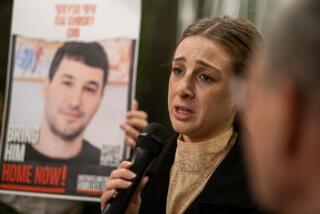Ex-Soviet Refuseniks Thank Pomona Children for Help
- Share via
Addressing the group of Hebrew school students at Temple Beth Israel in Pomona last week, former Soviet refusenik Leonid Byaly recalled the difficulties of celebrating his son’s bar mitzvah in a country where religious ceremonies are prohibited.
Because the family’s Moscow apartment was too small to accommodate friends and relatives, the Byalys had to hold the rite of passage in a forest about 40 miles outside of town. At the last minute, the family changed the time and exact location of the ceremony to avoid trouble from the KGB.
“But unfortunately,” Byaly told the children in a thick Russian accent, “there appeared three KGB agents who said because of (a) special order, no more than three people (could) be in (the) forest without special permission. So, our son’s bar mitzvah was interrupted.
“This moment, my son (could) not forget. At this moment, he dreamed of being in a free country, and now his dreams are realized.”
Thanked Children
Byaly and his wife, Judith Ratner-Byaly, came to Pomona last week to thank the children of Temple Beth Israel for their help in realizing that dream. Seven years ago, the children at the synagogue “adopted” the Byaly family and ever since have sent them cards, letters and pictures on Jewish holidays.
More than 11 years after applying for permission to leave the Soviet Union, the Byalys were among 26 Jewish refusenik families granted exit visas last December as a good will overture before the third summit meeting between President Reagan and Soviet leader Mikhail S. Gorbachev.
Fortuitous timing and diplomatic pressure--not the children’s letters--helped secure the Byalys’ exit visas. In fact, most of the parcels did not make it past Soviet postal authorities. However, the Byalys said they were gratified when they learned of the children’s support through emissaries from the Pomona synagogue.
“We know you sent us many, many letters and pictures, but in Russia we (could) not receive them, because the government did not permit,” Ratner-Byaly told the group of students. “But we were touched, believe me. We (felt the) support. It was for us very important.”
In February, the Byaly family--with in-laws and the family dog in tow--finally left Moscow for Rehovot, Israel. Temple Beth Israel’s Rabbi Earl Kaplan, who had supervised the letter-writing efforts, visited the family earlier this year and invited them to Pomona.
When the Byalys stopped in Southern California last week on their tour of the United States, sponsored by the Union of Councils on Soviet Jewry, Kaplan feted the couple as “heroes of modern Jewish history.”
“The excitement here last week when we finally learned they were coming was palpable,” Kaplan said. “The children were thrilled. The adults were thrilled. This is one of the most exciting events in the 57-year history of our congregation.”
As the children, clad mainly in shorts and T-shirts, sat on the floor of the synagogue’s education center, the Byalys, speaking in broken English, urged them to savor their religious freedom.
“You have big privilege to be born and live in democratic country,” Byaly told the young people. “It is very important, because many children in Russia have not this privilege.”
The Byaly family first applied to leave the Soviet Union in 1977. But the government denied the request because Leonid Byaly, 56, had had access to state secrets while working as a radio engineer five years earlier.
“Secrecy is not (the) real reason for refusal,” said Ratner-Byaly, 53. “It is (a) political game. Refuseniks are hostages of (this) political game.”
Temple Beth Israel became concerned with the family’s plight in 1981 when a teen-age congregation member decided to celebrate a “proxy” bar mitzvah for a young refusenik in the Soviet Union. The youth, Glenn Waldman, got the name of the Byaly family through an organization involved with the refuseniks’ cause .
As the wait for permission to emigrate became more frustrating, Judith Ratner-Byaly became increasingly active in the Soviet refusenik community. She helped found the Women’s Refusenik Protest Coalition, which staged several demonstrations in Red Square.
Under House Arrest
It was while planning a protest and press conference to coincide with the Washington summit between Reagan and Gorbachev that Ratner-Byaly learned that her family was free to go. But as part of the bargain, the couple was placed under house arrest for the duration of the summit.
Life outside the Soviet Union has been a mixed blessing for the Byalys. Not only are they free to study Hebrew in their new homeland, but the Israeli government pays them a stipend and provides free housing for a year. But that has been the family’s sole income, as neither Byaly nor his wife has been able to find work.
“Maybe economic situation is not so good,” Byaly said. “We are too young to receive pensions and too old to compete with young Israeli citizens in the market for jobs.”
But for the present, the couple’s main concern is publicizing the plight of refuseniks still in the Soviet Union. In Washington, D.C. last week, they gave a list of 300 refuseniks to officials with the Soviet embassy. Before leaving the United States, the Byalys hope to meet industrialist Armand Hammer to seek his help in securing visas for refuseniks Georgi Samoilovutch, Boris Rosenblit and Evgenia Langman, all of whom are in poor health.
Human rights conditions in the Soviet Union have improved under Gorbachev’s policies of glasnost (openness) and perestroika (restructuring), the Byalys said. But even under these reforms, Jews wishing to emigrate to Israel continue to face difficulties and delays, they said.
“I think under glasnost and perestroika, things for refuseniks (have) become a little better,” Ratner-Byaly said. “But the world thinks that in the Soviet Union things are going so well, there is no problem. It is not true. In spite of glasnost and perestroika, there is a very big problem for refuseniks in Moscow.”
More to Read
Sign up for Essential California
The most important California stories and recommendations in your inbox every morning.
You may occasionally receive promotional content from the Los Angeles Times.













